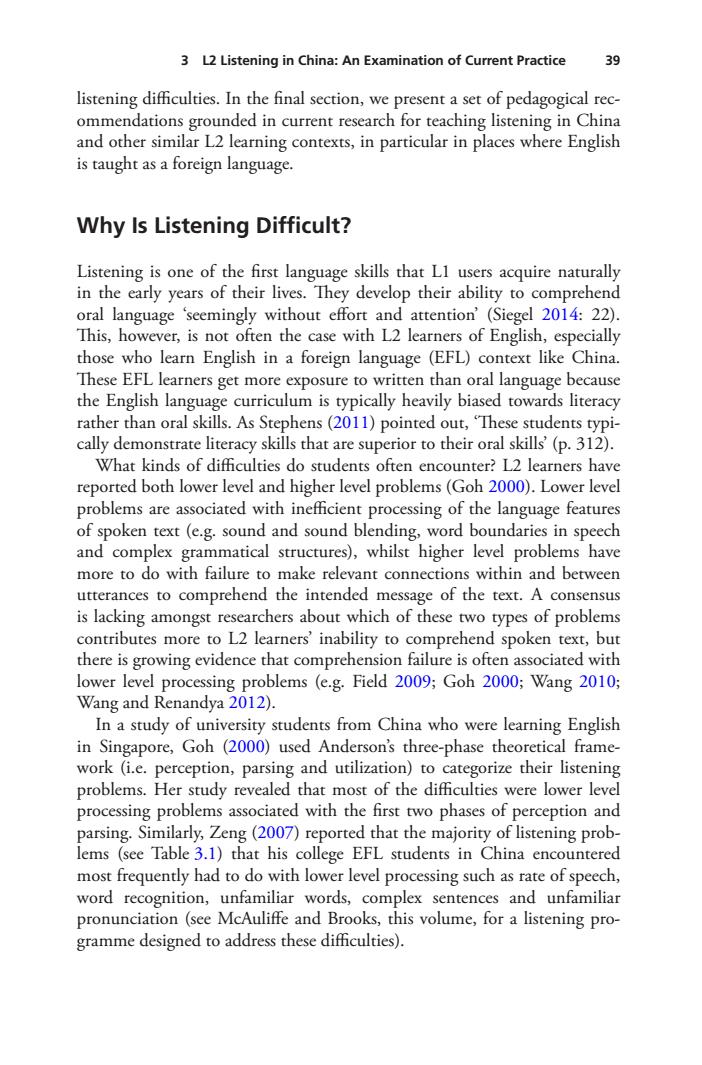正在加载图片...

3 L2 Listening in China:An Examination of Current Practice 39 listening difficulties.In the final section,we present a set of pedagogical rec- ommendations grounded in current research for teaching listening in China and other similar L2 learning contexts,in particular in places where English is taught as a foreign language Why Is Listening Difficult? Listening is one of the first language skills that LI users acquire naturally in the early years of their lives.They develop their ability to comprehend oral language 'seemingly without effort and attention(Siegel 2014:22) This,however,is not often the case with L2 learners of English,especially those who learn English in a foreign language (EFL)context like China. These EFL learners get more exposure to written than oral language because the English language curriculum is typically heavily biased towards literacy rather than oral skills.As Stephens(2011)pointed out,These students typi cally demonsrate literaey skills that are superior to theirr skills(p.31) What kinds of difficulties do students often encounter?L2 learners have reported both lower level and higher level problems(Goh 2000).Lower leve problems are associated with inefficient processing of the language features of spoken text(e.g.sound and sound blending ord boundaries in speech and complex grammatical structures),whilst higher level problems have more to do with failure to make relevant connections within and between utterances to comprehend the intended message of the text.A consensu is lacking amongst researchers about which of these two types of problems contributes more to L2 learners'inability to comprehend spoken text,but there is growing evidence that comprehension failure is often associated with lower level processing problems (e.g.Field 2009;Goh 2000;Wang 2010; Wang and Renandya 2012). In a study of university students from China who were learning English in Singapore,Goh (2000)used Anderson's three-phase theoretical frame- work(i.e.perception,parsing and utilization)to categorize their listening problems.Her study revealed that most of the difficulties were lower level processing problems associated with the first two phases of perception and parsing.Simi arly,Zeng(2007)reported that the majority of listening prob lems (see Table 3.1)that his college EFL students in China encountered most frequently had to do with lower level processing such as rate of speech, word recognition,unfamiliar words,complex sentences and unfamiliar pronunciation (see McAuliffe and Brooks,this volume,for a listening pro- gramme designed to address these difficulties). 3 L2 Listening in China: An Examination of Current Practice 39 listening difculties. In the fnal section, we present a set of pedagogical recommendations grounded in current research for teaching listening in China and other similar L2 learning contexts, in particular in places where English is taught as a foreign language. Why Is Listening Diffcult? Listening is one of the frst language skills that L1 users acquire naturally in the early years of their lives. Tey develop their ability to comprehend oral language ‘seemingly without efort and attention’ (Siegel 2014: 22). Tis, however, is not often the case with L2 learners of English, especially those who learn English in a foreign language (EFL) context like China. Tese EFL learners get more exposure to written than oral language because the English language curriculum is typically heavily biased towards literacy rather than oral skills. As Stephens (2011) pointed out, ‘Tese students typically demonstrate literacy skills that are superior to their oral skills’ (p. 312). What kinds of difculties do students often encounter? L2 learners have reported both lower level and higher level problems (Goh 2000). Lower level problems are associated with inefcient processing of the language features of spoken text (e.g. sound and sound blending, word boundaries in speech and complex grammatical structures), whilst higher level problems have more to do with failure to make relevant connections within and between utterances to comprehend the intended message of the text. A consensus is lacking amongst researchers about which of these two types of problems contributes more to L2 learners’ inability to comprehend spoken text, but there is growing evidence that comprehension failure is often associated with lower level processing problems (e.g. Field 2009; Goh 2000; Wang 2010; Wang and Renandya 2012). In a study of university students from China who were learning English in Singapore, Goh (2000) used Anderson’s three-phase theoretical framework (i.e. perception, parsing and utilization) to categorize their listening problems. Her study revealed that most of the difculties were lower level processing problems associated with the frst two phases of perception and parsing. Similarly, Zeng (2007) reported that the majority of listening problems (see Table 3.1) that his college EFL students in China encountered most frequently had to do with lower level processing such as rate of speech, word recognition, unfamiliar words, complex sentences and unfamiliar pronunciation (see McAulife and Brooks, this volume, for a listening programme designed to address these difculties)